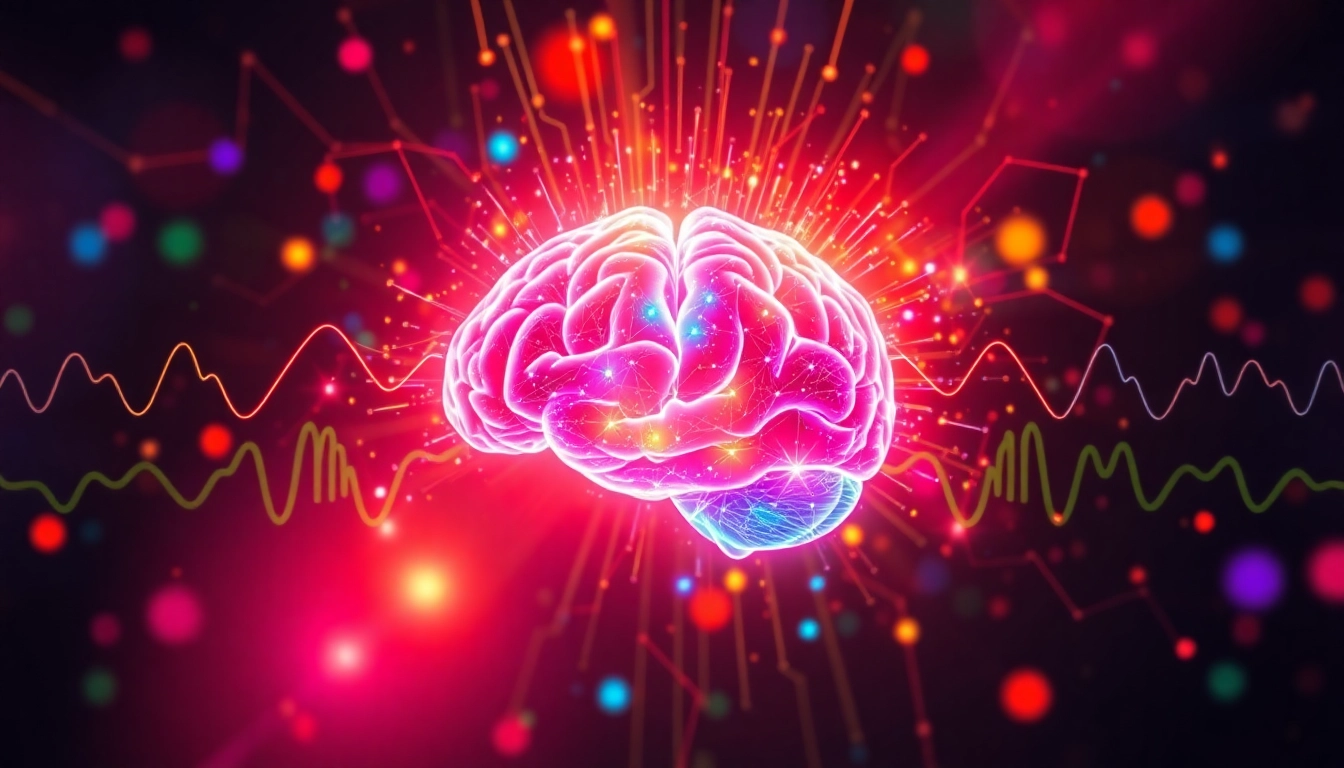Understanding Nootropics: What Are They?
Nootropics, often referred to as “smart drugs,” are substances that are believed to enhance cognitive function, particularly executive functions, memory, creativity, or motivation in healthy individuals. The term ‘nootropic’ was coined in the 1970s by Romanian psychologist and chemist Corneliu E. Giurgea, who described these substances as compounds that improve cognitive functions without significant side effects. As a pivotal part of cognitive enhancement discussions, nootropics have gained immense popularity among students, professionals, and individuals seeking to improve their mental performance.
The Origins of Nootropics
The origins of nootropics trace back to the discovery of the first synthetic nootropic, Piracetam, by Giurgea. His research aimed at creating compounds that would stimulate the brain without presenting the risks typically associated with traditional psychotropic medications. As research evolved, various natural substances, such as Ginkgo Biloba and Panax Ginseng, were also classified as nootropics, paving the way for a broader understanding of cognitive enhancers.
Types of Nootropics: Natural vs. Synthetic
Nootropics can be broadly categorized into two groups: natural and synthetic. Natural nootropics encompass herbs and dietary supplements like Rhodiola Rosea, Bacopa Monnieri, and Omega-3 fatty acids, known for their cognitive-enhancing properties. Synthetic nootropics, on the other hand, involve chemically manufactured compounds such as Modafinil and Adderall, primarily designed to treat conditions like ADHD and narcolepsy, but often misused for cognitive enhancement. Understanding the differences between these two categories is essential as it influences effectiveness, side effects, and potential long-term impacts on mental health.
How Nootropics Work in the Brain
Nootropics operate through a variety of mechanisms in the brain. They primarily enhance the availability of neurotransmitters or promote neural pathways, thereby improving communication between neurons. For example, the natural nootropic Rhodiola Rosea is thought to optimize the levels of serotonin, dopamine, and norepinephrine, which play a critical role in mood regulation and cognitive performance. In comparison, synthetic nootropics like Modafinil increase dopamine levels by inhibiting its reuptake, providing a sense of alertness and focus. Understanding these mechanisms is vital for anyone considering the addition of nootropics to their daily regimen.
The Benefits of Nootropics for Mental Performance
The potential benefits of nootropics extend across various aspects of mental performance, influencing everything from memory to stress management. As more individuals explore cognitive enhancers for personal and professional advantages, understanding these benefits becomes increasingly important.
Enhancing Memory and Focus with Nootropics
Memory enhancement is one of the most sought-after benefits of nootropic use. Compounds like Bacopa Monnieri have been shown in studies to improve memory retention and recall, particularly in elderly populations. Researchers attribute this effect to Bacopa’s ability to reduce anxiety and boost synaptic activity in critical memory regions of the brain. Similarly, nootropics such as L-Theanine, often paired with caffeine, facilitate improved focus and attention by enhancing alpha brain wave production, providing a calm but alert mental state crucial for tasks requiring extended concentration.
Nootropics and Stress Management
In today’s fast-paced world, stress management is of utmost importance for cognitive performance. Certain nootropics, like Ashwagandha, possess adaptogenic properties, which help users manage stress and anxiety levels. A study conducted at the University of Connecticut found that participants who supplemented with Ashwagandha experienced significant reductions in stress levels, reflected in lower cortisol, the stress hormone. This stress-reducing effect can have a profound impact on cognitive functions, as excessive stress is known to hinder memory, attention, and overall mental acuity.
Long-Term Benefits of Nootropic Use
While many individuals focus on the immediate cognitive boosts provided by nootropics, their long-term impact is equally promising. Research suggests that consistent use of nootropics such as Lion’s Mane Mushroom may promote neurogenesis—the growth of new neurons—thereby contributing to long-term brain health. Furthermore, studies have linked long-term use of omega-3 fatty acids with improved cognitive aging, potentially staving off age-related mental decline. As such, incorporating nootropics into a balanced lifestyle may yield lasting cognitive benefits that enhance overall quality of life.
Choosing the Right Nootropics for You
Selecting the right nootropic can be overwhelming due to the vast array of options available. Each individual has unique cognitive needs and health considerations, making informed choices critical for optimal benefits.
Factors to Consider When Selecting Nootropics
When choosing a nootropic, several factors should influence your decision. First and foremost, identify your specific cognitive goals—whether it’s improving memory, increasing focus, or managing stress. Additionally, consider any underlying health conditions or medications you may be taking, as interactions can occur. The purity and source of the nootropic are also crucial; sourcing from reputable manufacturers and opting for third-party tested products can help ensure quality and efficacy. Lastly, individual tolerance and sensitivity to various substances can differ greatly, so starting with lower doses and gradually increasing can allow for better assessment of effects.
Popular Nootropic Options Reviewed
Among the myriad options available, several nootropics stand out for their popularity and efficacy. Some of the well-researched nootropics include:
- Piracetam: Known as the original nootropic, it enhances memory and learning capacity.
- Rhodiola Rosea: An adaptogen that can help improve mental performance under stress.
- Bacopa Monnieri: Effective for memory enhancement, particularly in the elderly.
- L-Theanine: Supports relaxation while boosting focus, especially when paired with caffeine.
- Modafinil: A powerful wakefulness-promoting agent, often used for focus and productivity.
Each of these options presents unique benefits and mechanisms, making them suitable for different cognitive enhancement needs.
Assessing Quality and Safety in Nootropic Products
Quality assurance is vital in the nootropic space due to the lack of regulation surrounding many supplements. When selecting nootropic products, prioritize brands that voluntarily adhere to Good Manufacturing Practices (GMP) and conduct third-party testing for purity and potency. This practice ensures that the product does not contain harmful contaminants or undisclosed ingredients. Additionally, looking for transparency in-labeling, such as detailed ingredient sourcing and usage recommendations, can help you make informed decisions.
Incorporating Nootropics into Your Daily Routine
Integrating nootropics into your lifestyle requires thoughtful planning and consistency to achieve desired results. This section will explore how to effectively include them in your daily routine.
Combining Nootropics with Lifestyle Changes
While nootropics can provide significant cognitive benefits, their effectiveness is often amplified when combined with healthy lifestyle changes. Regular physical exercise, a nutritious diet rich in omega-3s, and adequate sleep all contribute to improved mental performance. Moreover, practices such as mindfulness and meditation can complement the effects of nootropics by promoting relaxation and focus. By creating a holistic approach that integrates cognitive enhancers with healthy habits, individuals may experience enhanced cognitive function more sustainably.
Optimal Dosages and Timing for Nootropic Use
Dosage and timing are critical elements that can impact the effectiveness of nootropics. For instance, some nootropics, such as L-Theanine, can be taken shortly before tasks requiring concentration, while others, like Bacopa Monnieri, are best consumed over extended periods for cumulative benefits. Adhering to recommended doses on labels, along with personal adjustments based on individual responses, is crucial. Furthermore, timing supplements around daily peaks of productivity can maximize cognitive gains—experimenting and tracking your routines can lead to the best personal outcomes.
Tracking Progress: How to Measure Nootropic Effectiveness
Tracking your progress is paramount when incorporating nootropics into your life. Keeping a journal to document your cognitive performance, mood changes, energy levels, and any side effects can provide insight into how these substances affect you. Consider conducting regular self-assessments with standardized cognitive tests available online or through mobile applications to measure improvements in memory, attention, and overall cognitive performance. This methodical approach allows you to evaluate your nootropic regimen critically and make intention-driven adjustments based on data.
Pitfalls and Precautions with Nootropics
While nootropics can offer significant cognitive enhancements, they are not without risks. It is essential to be aware of potential pitfalls and how to navigate them effectively.
Recognizing Possible Side Effects of Nootropics
Every nootropic user should be cognizant of potential side effects. While many natural nootropics boast favorable safety profiles, synthetic options may carry a risk of adverse effects ranging from mild to severe. For instance, while caffeine can enhance focus, excessive intake may lead to anxiety and sleep disturbances. Similarly, Modafinil is generally well-tolerated but can cause side effects like headaches and dizziness in some users. Understanding these potential side effects allows for informed decision-making and timely adjustments to your regimen.
Understanding Individual Responses to Nootropics
It is crucial to recognize that individual responses to nootropics can vary significantly due to factors such as genetics, lifestyle, and overall health. What works for one person may not yield the same results for another. This variability is particularly significant in the realm of cognitive enhancers, where the subjective experience plays a critical role. Engaging in an experimental approach—testing different nootropics, dosages, and timing—can help you discover what specifically works for your unique cognitive profile.
When to Consult a Healthcare Professional about Nootropics
If you have pre-existing health conditions or are taking prescribed medications, consulting a healthcare professional before incorporating nootropics into your routine is paramount. Some nootropics may interact negatively with medications or exacerbate certain health issues. A qualified healthcare provider can offer insights into safe supplementation practices and tailor recommendations to best suit your specific needs, ensuring both safety and efficacy when pursuing cognitive enhancement.




